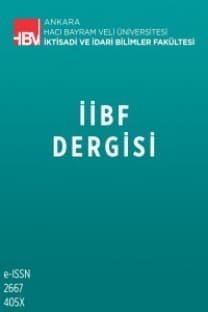KIBRIS’TA TÜRK VE RUM HALKLARININ 1960-1983 YILLARI ARASINDA EKONOMİK YAPISI VE ÖZELLİKLERİ
Bu araştırmada, Kıbrıs’ta Türk ve Rum halklarının 1960-1983 yılları arasındaki ekonomik yapısına ve özelliklerine bakılmıştır. Buradan hareketle araştırmanın temel amacı, Kıbrıs’ta taraflar arasında cereyan eden görüşmelerde federal devletin ekonomik yapısında yer alması gereken kriterlerin ne olması gerektiği gösterilmiştir.Kıbrıslı Türklerin tarım ve kamu görevine dayalı geleneksel yaşam biçimine karşın, Kıbrıslı Rumlar, sanayi ve hizmet sektörü temelinde ve modern kapitalist bir ekonomik modelde yapılanmışlardır. Ancak Kıbrıslı Türkler, ticarî burjuvazinin egemenliğinde, geniş fakat küçük bir burjuva topluluğu hâlinde ve küçük mülk sahipliğine dayalı yeni bir ekonomik ünite de geliştirmişlerdir.Buna karşın Kıbrıslı Rumlar, modern kapitalist bir toplum hâline gelmeyi başarmışlardır. Hatta Türk Barış Harekâtı, Kıbrıs Rum toplumunun bütün şikâyet ve tepkilerine karşın, 1974 öncesinde 2.000 dolar civarında olan millî gelirini, şimdilerde 15.000 dolara kadar çıkmasına da etki yapmıştır.Bu gerçekten hareketle araştırma, üç ana bölümden oluşmaktadır. Birinci bölümde Türk ve Rum toplumlarının 1960’dan 1983’e kadarki dönemde İngiliz Sömürge, Kıbrıs Cumhuriyeti ve 1974 Barış Harekâtı sonrasında ortaya çıkan unsurlar incelenmiştir. İkinci bölümde Kıbrıslı Türklerin ekonomik durumu ve özellikleri değerlendirilmiştir. Üçüncü ve son bölümde ise Kıbrıslı Rumların ekonomik durumu ve uyguladıkları ambargonun ekonomik ve siyasal gerekçeleri ele alınmıştır.
The Economic Structure of the Turkish and Greek Communities in Cyprus during 1960-1983 and its Properties
In this research, the economic structure of the Turkish and Greek communities in Cyprus during 1960-1983 and its properties have been observed. Based on this, as the main purpose of this research, which criteria must exist in the economic structure of the federal state during the talks taking place between the two parties in Cyprus have been expressed. In comparison to the Cypriot Turks' traditional lifestyle which is based on agriculture and civil service, the Cypriot Greeks have been organized on a foundation of the industry and service sector and upon a modern capitalist economic model. However, the Cypriot Turks, under the domination of a commercial bourgeoisie, have formed a new economic unit as a wide but small bourgeoisie group and based on a small proprietorship. On the opposite, the Cypriot Greeks have succeeded in becoming a modern capitalist community. In fact, the Turkish Peace Movement, despite all complaints and reactions of the Cypriot Greek community, has also caused their national income, which was approximately 2.000 dollars before 1974, to increase to 15.000 dollars at the moment. Based on this fact, this research consists of three main sections. In the first section, the Turkish and Greek communities during the period from 1960 to 1983 have been observed in regards to the facts emerging after British Colonialism, the Republic of Cyprus and the 1974 Peace Movement. In the second section, the economic situation of the Cypriot Turks and its properties have been assessed. In the third and final section, the economic situation of the Cypriot Greeks and the economic and political facts of the embargo they placed have been addressed.
